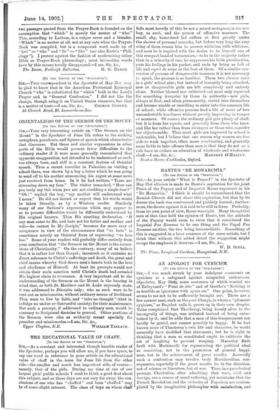ORIENTALISMS OF THE SERMON ON THE MOUNT.
[TO THE EDITOR OF THE "SPECTATOR."] Sra,—Your very interesting article on "The Sermon on the Mount" in the Spectator of June 7th refers to the striking metaphors, paradoxes, and figures of speech which characterise that discourse. But these and similar expressions in other parts of the Bible would present fewer difficulties to the ordinary reader if it were more generally remembered that apparent exaggeration, not intended to be understood as such, has always been, and still is, a constant feature of Oriental speech. Thus a recent traveller in Palestine, on visiting a school there, was shown by a boy a letter which he was going to send off to his mother announcing his regret at some news just received from home. In it he had written, "Tears are streaming down my face." The visitor remarked, "How can you truly say this when you are not shedding a single tear?" " Oh!" replied the boy, "my mother will understand what I mean." He did not intend or expect that his words would be taken literally, as by a Western reader. Similarly many of our Saviour's expressions which may appear to us to present difficulties would be differently understood by His original hearers. Thus His startling declaration, "If any man come to Me, and hate not his father and mother and wife—he cannot be My disciple," becomes far more easy of acceptance in view of the circumstance that "to hate" is sometimes merely an Oriental form of expressing "to love less." Some of your readers will probably differ entirely from your conclusion that "the Sermon on the Mount is the corner- stone of Christianity." On the contrary, many of us believe that it is rather law than Gospel ; inasmuch as it contains no direct reference to Christ's sufferings and death, the great and chief means whereby God draws men's hearts both to the love and obedience of Himself. At least its precepts would not obtain their main sanction until Christ's death had revealed His highest claim to reverence. A very important aid to the understanding of the Sermon on the Mount is the bearing in mind that, as both St. Matthew and St. Luke expressly state, it was addressed to Disciples only; who as such were to be sent out as missionaries, without ordinary means of livelihood. They were to live by faith, and "take no thought" (that is, indulge no undue or distrustful anxiety) for their maintenance. But such a precept, if addressed to ordinary men, would be contrary to Scriptural doctrine in general. Other portions of the Sermon were also as evidently meant specially for preacher and missionaries.—I am, Sir, &a.,










































 Previous page
Previous page